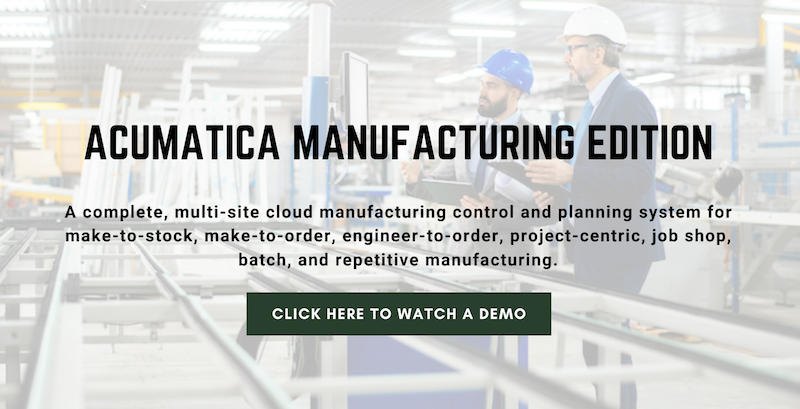The Manufacturing industry is experiencing growth across the spectrum. Expect spending on cloud-based applications and platforms to double that of past years in the 2019-2023 forecast period, according to the most recent International Data Corporation (IDC) Worldwide Semiannual Public Cloud Services Spending Guide.
Today’s manufacturers are expected to increase spending from $229 billion in 2019 to about $500 billion in 2023, with a five-year compound annual growth rate (CAGR) of 22.3%.
There are definite needs that manufacturers are working to improve, including operations, which can benefit from more speed, scale, and accuracy. Companies are realizing that accelerating time-to-market, increasing the quality of products, and improving customer relations can help drive growth and profitability.
1. Quality Improvements
Say goodbye to silos and welcome integration across areas of production. A cloud-based ERP solution enables manufacturers to assess every aspect of quality; imagine the difference real-time data could make in regards to tracking and traceability. Inbound inspection processes and quality management become extremely insightful and when coupled with cutting-edge technology, can save manufacturers the losses from shipping out entire lots of defective parts. An ERP connects warehouses — all receive actionable insights at the same time, regardless of where they are located.
2. Overall Equipment Effectiveness (OEE)
Manufacturers rely on the equipment they work with, so it’s no surprise that keeping machinery and tools at top performance can drastically improve the work a company can do. Modern cloud platforms provide a system of record that includes OEE for equipment and tool levels, providing insights into which areas are performing optimally, as well as those that require improvement. With an ERP system in place, shops can capture, track, and analyze the machinery they use and improve efficiency to steer clear of unnecessary costs. Teams can perform more productively when they have deep insights to work with.
3. Cycle Time
The time an order is placed until the product is produced and moved to finished goods inventory is considered cycle time. The more a manufacturer knows directly correlates to what it can do to make gains and stay competitive in the market. Cloud-based ERP solutions give companies the tools they need to achieve results; real-time visibility, supply chain integration, and increased operational flexibility come through clear data, which can be deployed seamlessly across the organization. When pricing, quoting, and customer approval workflows are automated, cycle times can be reduced even though quality is improved.
4. Tracking and Traceability
Visibility across the supply chain is a key factor to manufacturers, and those that operate in multiple locations need to be able to gain oversight even more. Improved insights, thanks to cloud-based applications, give business owners relief from the financial hit of a product recall, as they help to catch product quality issues early in the game. Real-time data can save a manufacturer from unforeseen and unpredictable expenses, which helps increase the bottom line.
5. Supply Chain Performance
It’s essential that a manufacturing company knows its supply chain levels — the more insights available provide the best chance of inventory planning and management across production centers. The ERP combined with a cloud-based inventory management system (IMS) can reveal patterns or cycles that makes it possible to anticipate shifts in demand. This eases the risk of forecasting errors, while providing improved production planning and schedules across all of the organization’s warehouses. Manufacturers can expect to see profit growth and increased revenue gains with implementation of analytics systems that optimize inventory, order management, and fulfillment.
6. Compliance and Reporting
Manufacturers are mandated to maintain device history records to product batch, lot, and unit levels by the U.S. Food & Drug Administration (FDA) Code of Federal Regulations (CFR) Title 21. Other areas of manufacturing may require that additional standards be met. Valuable time can be saved when cloud-based compliance applications are capable of producing federal device history records (DHRs), which eliminates the need for employees to hand key report records for industry and government filings.
Getting Started with Acumatica Manufacturing Edition
Acumatica makes it easy for Manufacturers to implement a single solution that ties in every aspect of business. With a highly advanced system, customers are able to take advantage of the many beneficial aspects a cloud-based ERP system includes. Acumatica’s Cloud ERP Software is built on the world’s best cloud and mobile technology and is the fastest growing provider, delivering modern solutions for ERP. Streamlining processes and gaining improved visibility over all aspects of operations can accelerate business growth.
With a long running history of partnering in software excellence, we look forward to the opportunity to take clients into the future with cutting-edge software technology that delivers results. Contact us to learn more!
Additional Manufacturing ERP Resources
What to Look For in ERP Software
How to Select the Best ERP For Your Organization


